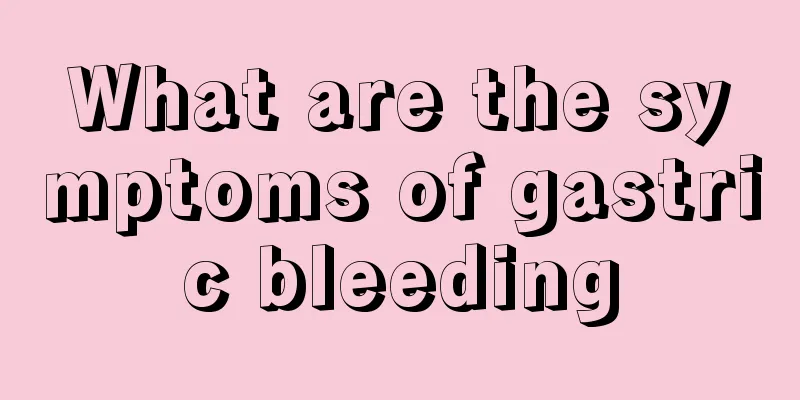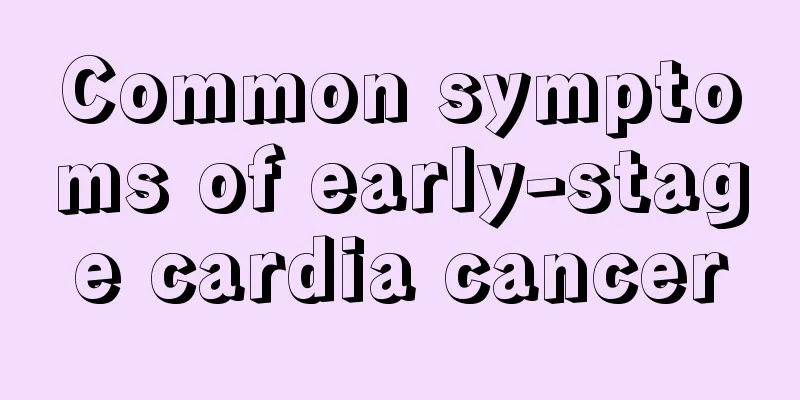What are the symptoms of gastric bleeding

|
Gastric bleeding is what people often call gastrointestinal bleeding. It is a relatively serious emergency. The symptoms of gastric bleeding are multifaceted. Severe patients have heavy bleeding and are accompanied by fever. Ignoring the treatment of gastric bleeding can easily worsen or even be life-threatening. 1. Azotemia If gastric bleeding occurs, azotemia may occur. 2. Fever In cases of moderate or massive bleeding, fever occurs within 24 hours, mostly below 38.5 degrees, and lasts for several days to a week. 3. Vomiting blood and/or black stools It is a characteristic manifestation of upper gastrointestinal bleeding. Patients with bleeding above the pylorus often experience vomiting blood and black stools, while patients with bleeding below the pylorus may only experience black stools. However, lesions above the pylorus with a small amount of bleeding and a slow bleeding rate may only cause black stools, while lesions below the pylorus with a large amount of bleeding and a fast bleeding rate may cause vomiting of blood due to the reflux of blood into the stomach. 4. Anemia and blood picture changes After acute massive hemorrhage, there will be hemorrhagic anemia. In the early stage of bleeding, there may be no obvious changes in hemoglobin concentration, red blood cell count and hematocrit. Generally, it takes more than 3 to 4 hours for anemia to appear. After 2 to 5 hours of massive upper gastrointestinal bleeding, the white blood cell count may increase significantly, and will return to normal 2 to 3 days after the bleeding stops. However, in patients with cirrhosis and hypersplenism, the white blood cell count may not increase. 5. Hemorrhagic peripheral circulatory failure Bleeding within 400ml may be asymptomatic, while moderate bleeding may cause anemia or progressive anemia, dizziness, weakness, and sudden standing up may cause syncope, thirst, cold limbs, and low blood pressure. Massive bleeding reaching 30% to 50% of the total blood volume can cause shock, which is manifested as irritability or confusion, pale complexion, cold and clammy limbs, cyanosis of the lips, difficulty breathing, blood pressure dropping to unmeasurable levels, decreased pulse pressure difference, and a rapid and weak pulse. If not handled properly, it can lead to death. |
<<: What to do if you have a big nose?
>>: Why do I feel my heart beating so fast?
Recommend
How to use hair clay
Hair clay is very common in our daily life. This ...
Hanging steam iron
We usually iron clothes, especially some high-end...
Is sodium chloride harmful to the human body?
Sodium chloride is a substance we are familiar wi...
Is it better to have toothpaste with or without fluoride?
Most of the toothpastes used in our daily life co...
How to treat recurrent or metastatic breast cancer
All malignant tumors have the possibility of recu...
What are the methods of soaking feet in vinegar
The soles of the human feet are very magical. The...
What are the common symptoms of cervical cancer? Regularly washing the vulva can prevent cervical cancer
Cervical cancer is a common malignant tumor that ...
Best uses for expired beer
As a type of alcohol, beer also has a shelf life....
What medicine is the most effective in treating body odor
Saving lives and healing the wounded is the docto...
Is makeup remover water or makeup remover oil better?
Now more and more female friends have joined the ...
Will my weight decrease if moisture is expelled
There are more and more weight loss institutions ...
Why do I have breast pain during menstruation?
Menstruation is something that women both look fo...
What are the symptoms of dizziness and muscle weakness?
Dizziness is a common symptom in patients with my...
What are the methods for detecting clenbuterol
Clenbuterol was originally used to treat bronchia...
What to eat for stomach cancer
People with gastric cancer are suitable to eat so...









